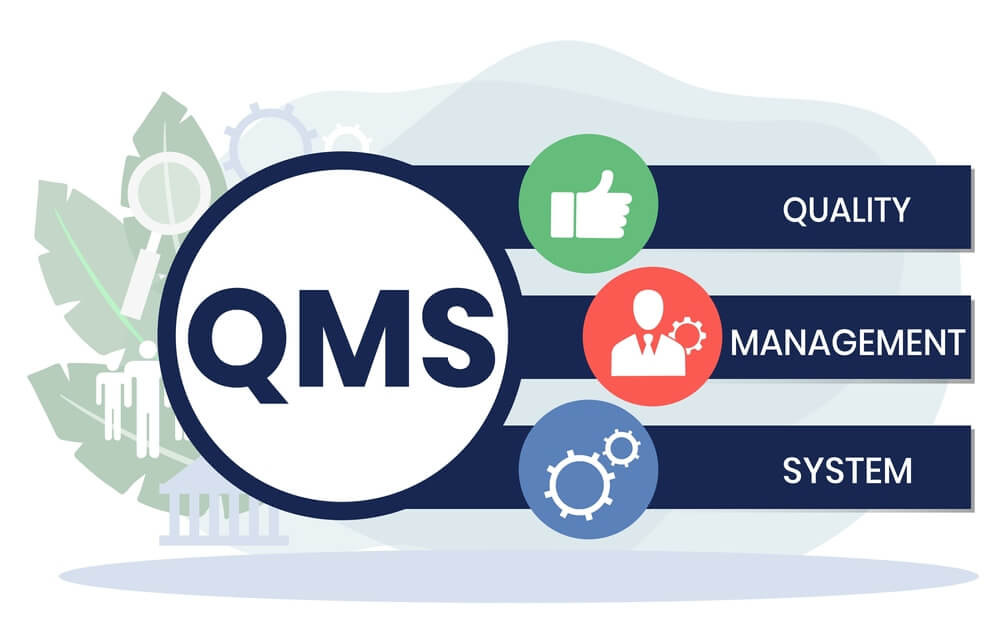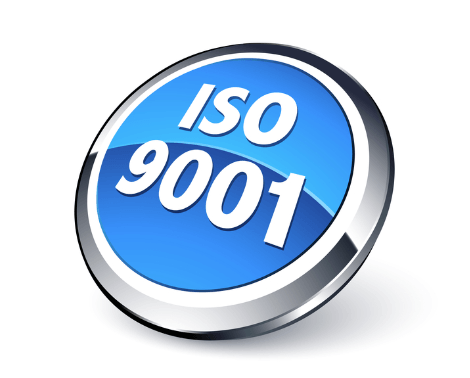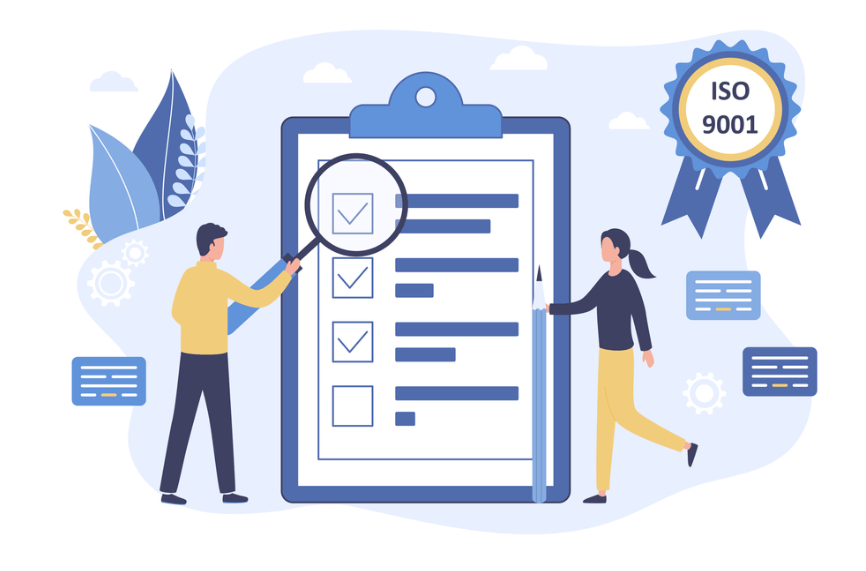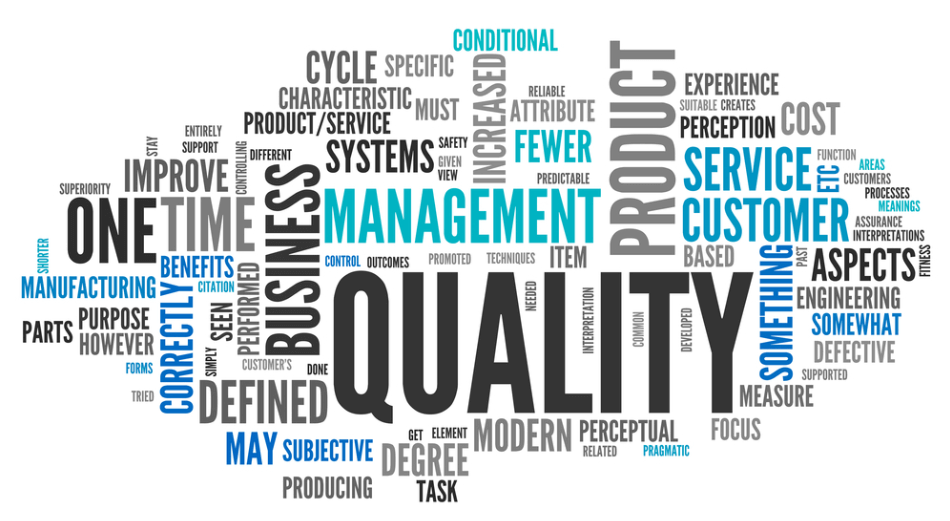What is ISO 9001:2015 Quality Management Systems?
ISO 9001:2015 is the updated version of ISO 9001:2008, the standard for Quality Management systems (QMS). The standard is revised and updated after a particular gap of years to meet the changing quality requirements of customers and evolving circumstances or challenges in the business environment. If your business has the earlier version of this standard, it is recommended to get the new one. Compliance with the latest ISO 9001 requirements helps your business stand out and achieve more potential for sales and growth. Also, ISO 9001 underpins the requirements of a Practical QMS, so meeting them helps your business achieve operational efficiency.
The ISO 9001 standard belongs to the ISO 9000 family. Certification to this standard means a company has a compliant management system focused on meeting its customer’s requirements. Certification shows that the company consistently provides quality products without making any compromises. ISO 9001 certification is the most popular management system that any organization can meet regardless of size or field. ISO 9001 comprises several quality management principles, including customer satisfaction, leadership, process and risk-based approach, and continual improvement.
Businesses consider the ISO 9001 standard the cornerstone for the quality management system (QMS) as it lays out the requirements for monitoring, administering, and improving the production and distribution processes and ensures the delivery of premium quality services or products. It provides a process approach in the organization that will ascertain continual improvement and satisfaction of customer wants.
ISO 9001 is the most recognized standard for QMS, as it helps organizations continually enhance or maintain the quality of their products and services and benefit their customers. ISO 9001 certification is only achieved when the organization follows a uniform framework or approach to quality management within the QMS. Achieving this certification will put the responsibility on the organization to improve their internal and external processes, encourage participation in quality management, and review the quality performance regularly. These will ensure that no substandard materials are used, processes are controlled efficiently, and only fine-tuned products are released into the market.
Quick Navigation
What is a QMS?
Businesses need a Quality Business Management System (QMS) for the apparent reason to improve and maintain the quality of their products or services consistently and ensure higher customer satisfaction. A quality management system (QMS) typically helps an organization oversee its processes, provide proper supplier materials, prevent process errors, and deliver the end products or services, keeping up to customers’ expectations.
Different sectors need different practices under their QMS because of the specific nature of their products or services and the needs of their customers.
3 Basic Points of Quality Management System (QMS)
On the International stage, ISO 9001 is one of the most popular quality management system standards. ISO 9001 standard is for every industry. ISO 9001 standard provides a guarantee of the products or services. You need to understand the basics of ISO 9001 before adopting it.

1). Systematic Approach Implementation – The entire quality assurance process is a systematic approach. This certification helps to create the effectiveness of the organization. It is only possible through understanding, analyzing, and managing the quality assurance process.
2). Good Relationships with Clients – A good relationship with the clients helps to increase the organization’s performance. It brings success to the organization. This relationship is not only with the clients. The business person needs to maintain a good relationship with the employees, investors, resellers, suppliers, and others. TUV Austria Bureau of Inspection & Certification (Pvt.) Ltd. helps you to build a relationship.
3). Improvement and Development of the Organization – If you need constant improvement, achieving ISO Certification can help you. Applying new methodologies and tools helps to improve your company.
Here’s A Video Tutorial About ISO 9001
Importance of the ISO 9001 Certification
The International quality management standard, ISO 9001, is an imperative strategic tool that needs to be integrated into your business management system. It helps to handle the critical challenges in your processes and prevent them from affecting the quality of your products or services. Integrating an ISO standard in your business management requires planned efforts and investing money and time. The ISO 9001 certification lets you have a definite set of processes for quality assurance in your core management system.

There are four elementary steps to getting your business certified with ISO 9001 and improving processes and quality outputs.
1). Developing the QMS
Identify your key goals regarding quality management and decide the procedures required to achieve them. Document them meticulously with the assistance of your employees and ensure that a robust QMS is formulated with appropriate procedures.
2). Implementing the QMS
Ensure that the procedures of your QMS are implemented as described in the documentation. For that, you need to train your employees and ensure they understand how to deploy the procedures.
3). Verify the Effectiveness of QMS
Conduct internal audits or periodic management reviews until certification arrives to ensure that QMS is competent enough to improve the processes and achieve your quality objectives.
4). Registration and Certification
You need to select a convenient accredited certification body for the final step. Please register for the ISO 9001 certification with their help and submit the necessary documents for your implemented QMS. Next, prepare for the external certification audit, which the body will conduct. Ensure that all ISO 9001 requirements are met in your QMS to pass the audit and get certified.
Getting the ISO 9001 certification seems daunting at first for every business. Still, if they plan for these crucial steps, the process can be smooth, cost-effective, and less time-consuming. The certification helps make your core business management system quality oriented and assures consistency in their final products or services.
What are the Benefits of ISO 9001?
ISO 9001 is the highest authority in quality business management for organizations, as it certifies their framework to address quality management. It lays down the requirements businesses should fulfill with their quality management framework. In short, it helps them integrate a robust quality management system (QMS) into their core business management that will monitor, control, assess, improve, and maintain the quality of their products or services.

ISO 9001 certification for QMS helps organizations with several assured and tangible benefits. Becoming customer-focused is the essential benefit that a certificate provides.
Efficient Resources Management – It will help you manage resources, including supplier products, intermediary services, people, and equipment used to produce your goods or services.
Product Realisation – The QMS details the structure or order of your business processes, such as production, quality checking, and distribution, to ensure the expected quality is delivered.
Consistent Monitoring and Analysis – It will help assess, monitor, and analyze the business processes and continuously improve them.
Increased Efficiency – The QMS helps to follow the best practices to reduce errors to inconsistencies in the business processes. Therefore, it helps to enhance efficiency.
Increased Customer Satisfaction – The QMS assures the delivery of top-notch products or services, and you will be able to meet every customer’s expectation.
Improved Employee Performance – By establishing a defined framework to streamline and manage the processes, the QMS boosts employee morale. With no ambiguity in the processes, they know their specific roles and can perform them better.
Higher Chance of Winning Business Contracts – Achieving international accreditation for your quality management will make your business attractive to suppliers, partners, and investors.
Reduced Faulty Products/Services – There are fewer or no problems encountered in end products or services by customers when a business follows an ISO-certified QMS.
Better Management – From the production processes to distribution management and risk assessment, everything is well managed by a comprehensive QMS.
Lower Costs – As the QMS streamlines processes in the business and leads to resource efficiency, costs are saved for the business.
Streamlined Processes – ISO 9001 standards require a business to follow streamlined processes and review them regularly to ensure no redundancies or waste of resources.
Consistent Quality Improvement – An effective QMS will provide a rock-solid foundation for businesses to improve their products or services’ quality.
Consistent Quality Control Practices – The implementation of the QMS requires a business to follow a set of quality control procedures and practices consistently.
Leadership and People Involvement – The implementation of a uniform QMS is possible when the top leaders or management take steps to develop the QMS and involve the people of the organization in executing the system.
Strong Customer Focus – The company needs to determine the expectations of their customers and align their QMS while considering them. Therefore, customer satisfaction is well met.
Process Efficiency – The QMS helps streamline the business’s production and distribution, leading to efficiency and decreased waste of resources.
Stakeholder Relationships are Protected – Customers are included with the stakeholders. They are confident when buying products, supplying materials, or investing in the business. When the business proves that they have a definite QMS which complies with the ISO 9001 standard, it builds trust in every stakeholder.
"It is the most important that top management be quality-minded. In the absence of sincere manifestation of interest at the top, little will happen below." Joseph M.Juran.
Focusing on quality in business management is the first step for any business that seeks to gain customers’ confidence in its product or services. While there are many indistinct frameworks or ways to control and manage the quality aspects, implementing a strong and definite management framework is needed. ISO 9001 certification will help to establish a quality management framework that focuses on quality.
How Does ISO 9001 Certification Improve the QMS of a Business?
ISO 9001 is the standard that sets out specific conditions for businesses to meet their quality management system or QMS. It is perhaps the most popular ISO certification that assists businesses of any type or scale to increase their efficiency, raise the quality of products/services, and satisfy their customers. The essential purpose for organizations to get certification is to meet all the quality objectives in their products or services with an effective QMS.

While most organizations have an inherent QMS for the quality assessment of their processes and products or services. Getting ISO 9001 certified will improve it and assure superior performance.
- A strict QMS encompasses the overall context of the business, starting from procurement processes to final product distribution. The certification allows the company to identify opportunities for improvements in its functions. It helps in determining which procedure is inefficient and improving it.
- Customer satisfaction is essential. ISO 9001 requirements focus on customer satisfaction, and the QMS is specifically improved to meet customer expectations regarding products/services, provide them with better customer service, and address their complaints faster.
- Processes are run efficiently. To make the QMS compliant with ISO 9001 requirements, align business processes and the involved employees. This helps to increase productivity by streamlining the processes and bringing down operational costs.
- A QMS that adheres to all ISO requirements will also meet the salutatory and regulatory conditions of the industry. Therefore, the QMS will be able to prevent the business from falling prey to industrial non-compliances.
Consider the advantages above if you are wondering if you should get your QMS ISO certified. Consider your business’s benefits by showing your commitment to quality management to customers, employees, supply partners, and other stakeholders. They will enjoy associating with a company that focuses on quality, efficiency, and improving customer satisfaction, providing more business opportunities.
What is ISO 9001 Certification Process?
If your business needs to update its existing QMS to the latest version, ISO 9001:2015, these are the five steps to follow.
Step 1
You can contact TUV Austria Bureau of Inspection & Certification (Pvt.) Ltd. and get familiar with the new ISO 9001 requirements. You need to understand what exactly has changed and is added to the standard to determine the required modifications in your QMS.
Step 2
Conduct a thorough gap analysis to discover which of your current QMS and business processes do not meet new requirements or parts of the provisions of ISO 9001:2015. This help in planning the next step for corrective action implementation.
Step 3
According to the observations of the gap analysis and updates required in the QMS, create an implementation plan and initiate training programs, if necessary.
Step 4
It would be best if you communicated with the employees and key stakeholders to ensure they are aware of their roles in the transition journey of your business to the new version.
Step 5
Start with implementing an updated or improved QMS by applying the changes.
What are ISO 9001 Requirements?

1). Context of the Organization
ISO 9001 defines the key purpose of a company’s strategic direction in the aspect of quality management, which is the organization’s context. This has to be determined while considering the external and internal business factors that influence the quality, stakeholder interests, and customer needs.
2). Leadership
The implementation of the QMS and its successful execution will highly depend on the collective efforts and commitment of the company’s top management.
3). Planning & Support
The ISO 9001 standard also requires the company’s management to plan for the design of the QMS, documentation, and implementation. They should provide resources, infrastructure, or staff to support implementation.
4). Operation
The standard also describes how the QMS needs to operate or work to meet the proposed goals and objectives of the company in the direction of quality management.
5). Performance Evaluation
The company should regularly analyze and measure the performance of the QMS with relevant metrics to ensure it is competent at supporting quality improvement for the business.
6). Improvement
The last requirement stresses the need for a QMS in a business, as it supports continual improvement in quality and other aspects. It calls for measures that will evaluate the quality of services or products, ensure they meet customer needs, and identify instances of non-conformance in the QMS, ensuring corrective actions can be taken.
As the top standard for quality management, ISO 9001 requires businesses to address all of these mentioned aspects. These are ISO 9001 requirements that will ensure the QMS of your business is effective and can ensure continuous improvement in the quality of their products or services. These requirements are also said to be keys or stepping stones of a successful quality management system.
How to Get ISO 9001 Certification in Pakistan?
ISO 9001 Certification in Pakistan is the hallmark of quality and standardization. Organizations in Pakistan that want to maintain their ability to meet customer demands with quality products and services must adhere to the Quality Management System. This standard is their most preferred choice.
As an international standard for Quality Management Systems (QMS), It has brought International quality control to local businesses. Small to large organizations in various sectors rely on improving operations, cutting costs, and delivering customer satisfaction.

In Pakistan, the First ISO 9000 certification was awarded in 1994. AGE was the first company that achieved this milestone, followed by Caltex and Philips Pakistan (Shahab & Tian, 2006). Initially, it started very slow; however, competing in the international market developed a positive trend towards its standard. According to ISO Survey 2014 (conducted in Pakistan), a total of “26476” ISO 9000 certifications were awarded from 1994 to 2014, including 2512 certifications in 2014 alone.
What is ISO 9001:2015 Certification Cost in Pakistan?
Organizations that want to reduce costs without compromising quality in today’s competitive environment look at 9001:2015 certification as a value-for-money solution. It is impossible to calculate the cost without a detailed risk assessment. Price also depends on many factors like:
- Size of Organization.
- Structure of Operations.
- Maturity and Complexity of Existing Systems.
Generally, this certification cost in Pakistan is not much compared to the improved productivity and brand equity benefits it offers to organizations.
Why Should You Choose Us?
Because we will never impose our approach on you, we will tailor an approach that covers your requirements. We will walk with you throughout the certification process.
Relevant: We’re the business standards company that can help your organization improve performance, manage risk more effectively, and enable sustainable growth.
Industry Thought Leaders: We continue to shape the world’s most widely adopted standards so that you can stay ahead.
Committed: Helping communities develop standards to self-regulate and harmonize.
Trusted: A Royal Charter Company that invests in creating new standards and improving clients’ experiences working with TUV Austria BIC.
TUV Austria Bureau of Inspection & Certification provides the best in class ISO 9001:2015 Certification and Lead Auditor Courses in Pakistan. We take pride in delivering excellent services across many industries in Pakistan & Bangladesh.
TUV Austria Bureau of Inspection & Certification has a huge umbrella of certification services, including:
- ISO 14001 – Environmental Management System
- ISO 45001 – Occupational Health & Safety Management System
- ISO 55001 – Asset Management — Management Systems Requirements
- ISO 27001 – Information Security Management System
- ISO 20000 – IT Service Management System
- ISO 22000 – Food Safety Management System
- HACCP – Food Safety Management System
- Halal Certification
- ISO 21001 – Educational Organizations Management System
- ISO 29990 – Learning Services Management System
- ISO 20121 – Sustainability Event Management System
- ISO 22301 – Business Continuity Management System
- ISO 37001 – Anti-Bribery Management System
- ISO 28000 – Supply Chain Security Management System
- ISO 13485 – Quality Management Systems for Medical Devices
- ISO 39001 – Road Traffic Safety Management System
- ISO 31000 – Risk Management – Guidelines
- ISO 22716 – Good Manufacturing Practices for Cosmetics
Final Words
Even though it is not made mandatory for any business, ISO 9001 Certification should be a top priority for companies because that standard is the benchmark for your quality management practices and can help them gain more customers. ISO 9001 QMS also brings efficiency and consistency to your processes, leading to cost savings. Thus, you, too, need to realize this and comply with the latest ISO 9001 requirements to get your company certified, apart from ensuring quality products and meeting customers’ needs.
FAQS
What Does ISO 9001 Stand for?
ISO 9001 is defined as the international standard that specifies quality management system (QMS) requirements. Organizations use the standard to demonstrate the ability to consistently provide products and services that meet customer and regulatory requirements.
When was ISO 9001 Established?
ISO 9001 was first published in 1987 by the International Organization for Standardization (ISO).
How to Implement ISO 9001?
Be clear about your QMS to avoid it becoming another set of documents for certification purposes only. Management should aim for a QMS to help the organization produce quality products or services, continuously improve its process, and give customers confidence that the organization can meet its requirements. People are the essence of the organizations, and their full involvement is essential to implementing and maintaining ISO 9001.
Employees can be motivated by:
-Ensuring that everyone knows and understands the organization’s quality policy.
-Defining and communicating responsibilities and authorities within the organization.
-Providing adequate infrastructure and work environment.
-Initiating improvements, e.g., by implementing employees’ suggestions.